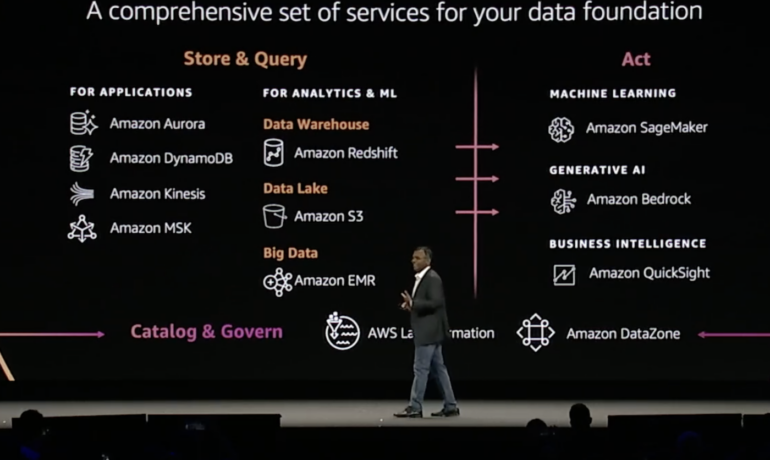
Discover new generative AI and machine learning products and services from AWS at AWS Summit New York 2023.
At the AWS Summit in New York City on Wednesday, July 26, the tech giant announced new AI models and agents in Amazon Bedrock, a new data analytics service called AWS Entity Resolution and other generative AI-enhanced services.
Jump to:
Amazon Bedrock is the foundation model library from AWS. It allows organizations to use and integrate a variety of the models that underpin generative artificial intelligence.
Command from Cohere, Claude 2 from Anthropic and Stable Diffusion XL 1.0 from Stability AI have now been added to Amazon Bedrock’s list of available models. Amazon’s own Titan, a text generation model that can also summarize text, answer questions or pull information from pools of data, and foundation models from AI21 Labs are also included in the Bedrock library.
The new models are now available for Amazon Bedrock customers.
Agents have also been added to Amazon Bedrock. These enable developers to hook foundational models to their own organization’s data source through API calls, cutting down on the amount of time and the number of clicks it takes to build a custom AI-powered application such as a customer service bot.
“This is a net new capability for developers to enable generative AI applications to complete tasks in just a few clicks … without having to write any code,” said Sivasubramanian.
SEE: AWS invests $100 million in Generative AI Innovation Center (TechRepublic)
The AWS Entity Resolution analytics service uses machine learning to match and link records.
“To ensure you have the right, relevant, high-quality data to train your models or customize these FMs for your use cases, you need a strong data foundation,” Sivasubramanian said.
To do so, AWS Entity Resolution can help business analysts and developers create workflows to gather, display and analyze large amounts of data. For example, AWS said, it might help a finance organization prevent fraud by connecting data between different accounts and credit cards.
AWS Entity Resolution is generally available now for AWS customers in the Asia Pacific, Europe, the U.K. and U.S. regions. For full geographical details, read the press release.
The vector engine is a new offering within OpenSearch Serverless that lets developers track and store vector endings (i.e., data points that tell a large language model which words are related to one another) alongside other business data and text. Vector engines are intended to make it easier to use OpenSearch Serverless to create machine learning-augmented search portals and generative AI applications.
“This vector engine offers simple, scalable and high-performing vector storage and search without having to manage any infrastructure,” Sivasubramanian said.
Vector engines within OpenSearch Serverless are now available for preview for AWS customers in the U.S., U.K., Asia Pacific and Europe regions; read the press release for more geographical details. The first 1,400 hours of proprietary capacity units per month will be available for up to two weeks of free usage, depending on the workload.
Generative AI integrations are coming to the business analytics tool Amazon QuickSight.
The new tool, called QuickSight Q, is intended for business analysts who spend a lot of time exploring data and creating visuals. They will be able to instruct QuickSight Q to create charts and dashboards from business data and to summarize that data using a feature called Create Story.
Ideally, human-in-the-loop AI assistance might end up being a sweet spot for business use between improving efficiently with bots and not simply cluttering up a service. It’s too early to say whether assistance like this will actually make workdays easier or whether Q will go the way of Microsoft’s ostensibly helpful Clippy.